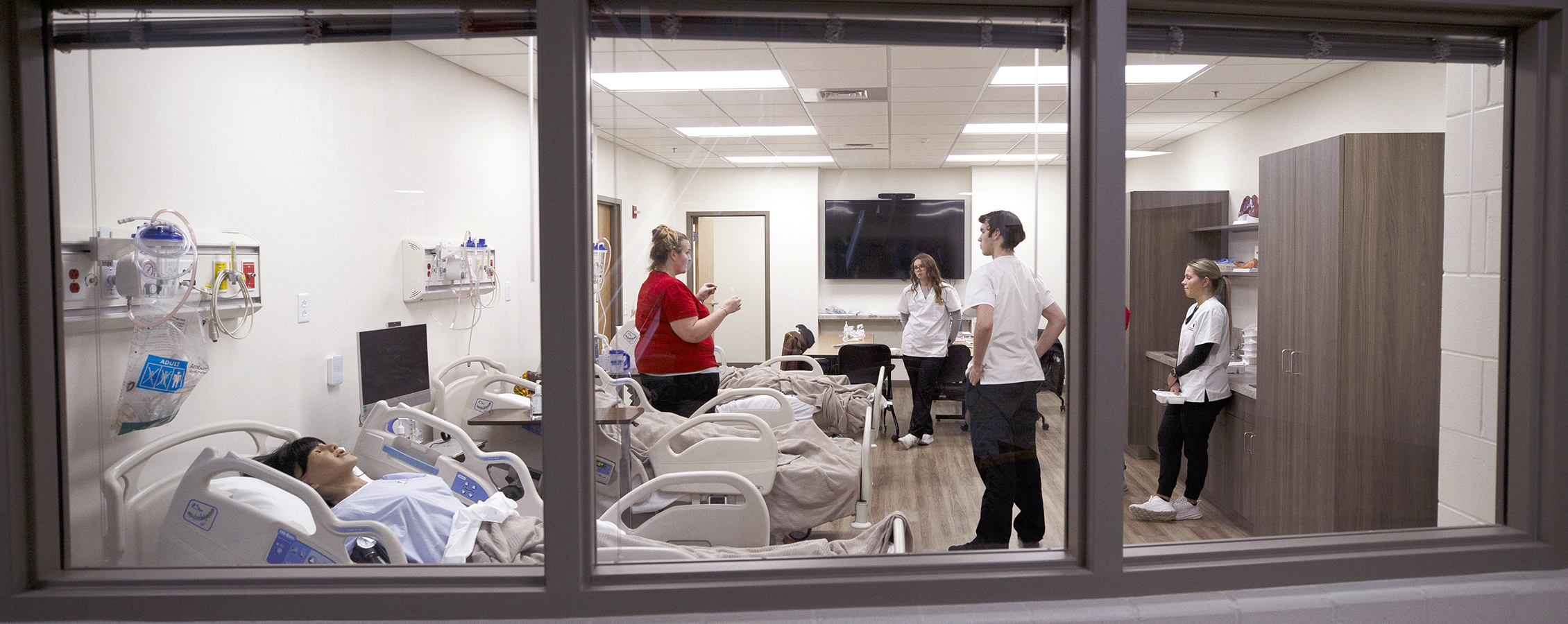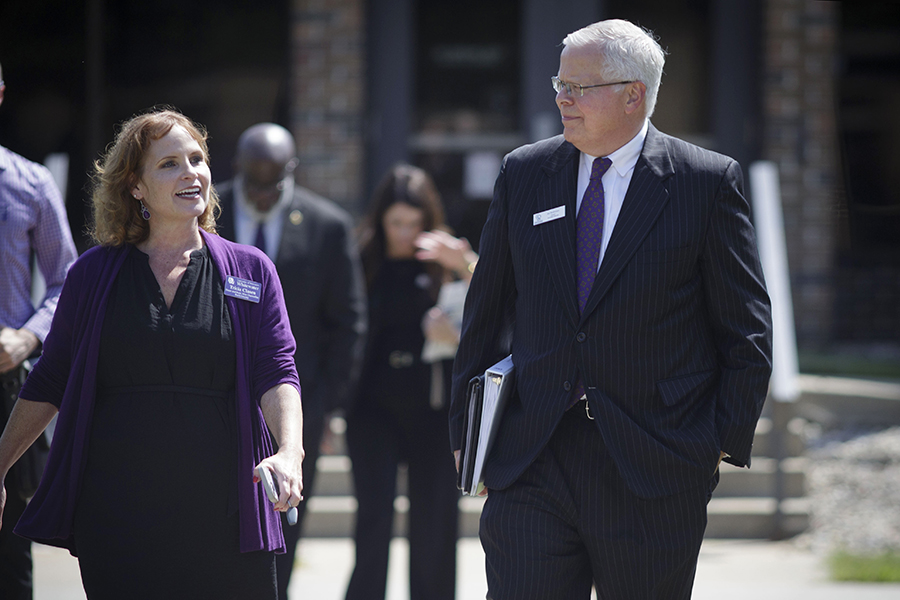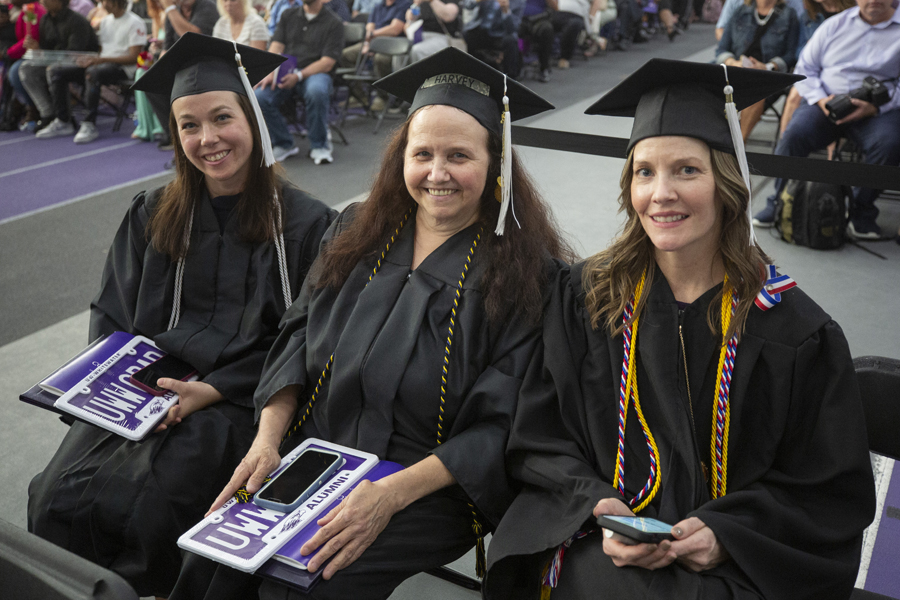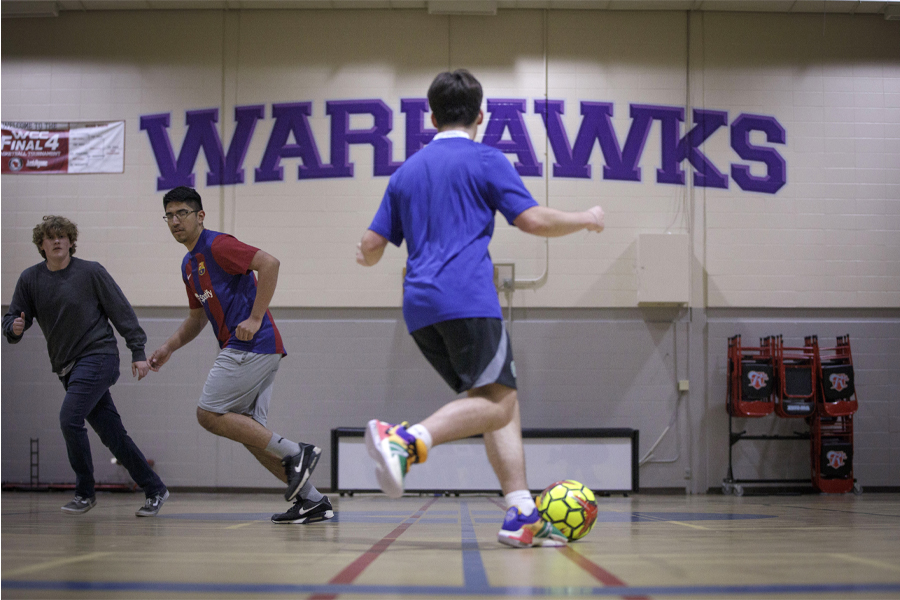Rock County nursing program builds infrastructure, skills
December 04, 2024
Written by Kristine Zaballos | Photos by Craig Schreiner
At the University of Wisconsin-Whitewater’s Rock County campus, construction is complete on two state-of-the-art spaces where the next generation of students will earn a Bachelor of Science in Nursing from Edgewood College, the result of a collaborative nursing degree program. These graduates will be primed for high-paying jobs — and ready to fulfill a critical regional workforce need.
The new labs feature patient simulators, which introduce nursing students to clinical scenarios in preparation for real clinical interactions and allow them to safely practice team-based care and improve individual skills. Three realistic patient rooms are viewable from a control room that allows instructors to monitor students and record sessions with audio-visual equipment that provides live-feed simulation. In the labs, robot patient simulators are programmed to replicate patient conditions and physiologic responses.
“This learning environment places students in the experience and fosters team-based learning as students learn, train, and work together,” said Rachel Icke, director of academic operations at the School of Nursing at Edgewood College. “This is where students apply their textbook knowledge, learn from their mistakes, practice skills, and improve communication. It’s also when future nurses emerge and begin to build their self-confidence.”
The new nursing labs will be open to tour 5-7 p.m. on Thursday, Dec. 12, during the December Business After Hours/Business After 5 event co-hosted by Forward Janesville, the Greater Beloit Chamber of Commerce, and UW-Whitewater.
“Touring the new labs, it’s amazing that we have this opportunity here in Janesville,” said Heidi Rye, a cardiology nurse practitioner at Mercyhealth in Janesville who is on the faculty at Edgewood College. “It’s a great addition to our community, and students get a quality education close to home.”
Rye, who teaches medical-surgical theory courses for the Collaborative Nursing Program at Edgewood College, says a major benefit of the collaborative program between Edgewood College and UW-Whitewater at Rock County is the smaller class sizes.
“You get more one-on-one time and attention from instructors in smaller groups,” said Rye. “And we stagger the classes so they are closer together so they can have full days off so they can work or take care of their families if they need to.”

Edgewood College nursing instructor Beth Hartwig, third from left, works with nursing students Aiden Brink and Juliann Russella in the new skills lab on the UW-Whitewater at Rock County campus. Like Heidi Rye, Hartwig is also a Mercyhealth employee. (UW-Whitewater photo/Craig Schreiner)
A program that meets a critical workforce shortage
The new nursing simulation and skills labs expand the capabilities of the collaborative nursing degree program with Edgewood College, launched in 2023, which allows students to study face-to-face on the Rock County campus without traveling out of the region to earn their degrees. Because students complete their clinical work in area hospitals, clinics and healthcare organizations, they are more likely to be hired by those employers and stay in the region after graduation. In 2023, southeastern Wisconsin experienced more than 1,500 nursing vacancies — a gap the program was designed to help fill.
“You have these goals and missions when you develop a partnership like this, and you really hope it translates to the student experience,” said Icke. “It’s always wonderful when you hear that students recognize that. All of our prerequisite nursing courses are full, and they have been since April.”
Michele Demmin, system director of professional development of nursing education and programs at Mercyhealth, has been involved in developing the collaborative degree program since its inception. She says the program’s collaboration with the hospital, where many of the students do their clinical work, has been successful.
“It is going very well, and we are enjoying having the Edgewood students onsite. Some of the students were part of our Student Nursing Intern Program this past summer, and we hope they continue to stay on with Mercyhealth after they graduate,” said Demmin. “The Edgewood students are very well prepared and professional — they take initiative and ask questions.”
The BSN program has enrolled 22 students on the Rock County campus in two cohorts of 11 students since the first classes began meeting in the fall of 2023. Eleven of the students participated in Mercyhealth’s Student Nursing Intern Program over the summer of 2024, at the halfway point in their program.

From left, nursing students Sydney Thompson, Ella Rau, Aiden Brink and Juliann Russella work with medical mannequins that simulate patients. Nursing students train in care of tracheotomy patients in a new teaching lab on the UW-Whitewater at Rock County campus on Thursday, Nov. 21, 2024. (UW-Whitewater photo/Craig Schreiner)
“It helps them continue on the educational pathway,” said Icke. “It helps them gain experience in an area they thought they wanted to work, maybe confirming to them that this is where they want to be. Some students stayed on in the workforce in a lighter capacity with the school year beginning.”
Nursing student Betsy Stanek participated in the nursing internship, which Mercyhealth calls the Student Nurse Intern program, or SNI, working in the emergency room. Even with five years of emergency medicine experience as an EMT with the Whitewater Fire Department, she was looking to confirm what area she might want to work in after she earns her BSN.
“The SNI program is one every nursing student should do,” said Stanek. “You have an instructor in clinicals who’s helping five or six students. In SNI you can help one nurse and work under their license — it makes it less terrifying.”
Stanek, who has a bachelor’s degree in history with a minor in business from UW-Whitewater, selected the collaborative nursing program offered on the Rock County campus because it allowed her to live at home in Whitewater, saving money so she would be able to fully focus on her studies rather than having to fit in a job. An unexpected benefit of the program was the small class sizes and the quality of the instructors.
“Heidi Rye is phenomenal,” said Stanek. “She’s a big part of why we’ve been able to succeed. She’s one of the best teachers I’ve had in my whole undergraduate experience.”
A seamless shift between campuses
Edgewood student Nick Jacobus grew up in Janesville and enrolled at UW-Whitewater at Rock County, where he earned his associate degree and served as student government president. After moving to the Whitewater campus to complete his bachelor’s degree, he heard about the new nursing degree. He realized he’d already completed a good number of the general education requirements — or gen eds — needed to apply to the BSN program.

Nursing students Hayle Acker, left, and Nick Jacobus practice an exam in class on the UW-Whitewater at Rock County campus. Third-year nursing students in a joint program between UW-Whitewater and Edgewood College started their semester on Thursday, Aug. 22, 2024. (UW-Whitewater photo/Craig Schreiner)
“The program is more hands-on, which I kind of like,” said Jacobus, who was interested in working in public health but didn’t want a job behind a desk. “We do a clinical rotation every semester. This semester I’m doing a clinical rotation in a surgical pediatric unit, and one in their ortho/neuro unit. That means we go in, get assigned a patient, and work as the nurse’s primary assistant, passing meds and helping to care for patients.”
Students work about 10-and-a-half-hour shifts in their rotations, and Jacobus, who also works 12-hour shifts as a CNA at SSM Health in Janesville, feels it is going well.
“I’ve got three more semesters,” he said. “I would like to stay in the region and get some more bedside experience in the hospital I am working at now.”
Jacobus, who looks especially forward to rotations in public health at local schools or at a free clinic in Beloit, said the transition to being an Edgewood student was seamless.
“The cohorts are small and the classes are small. It’s the same level of closeness as I had with the teachers with Rock. They are very personable.”
An open door to an opportunity to work in healthcare
A total of 696 students were enrolled at Rock in 2023-24, a 103-student increase from the year before. More than 50 are working on their general education requirements on a path to apply to the collaborative BSN program.
Kenosha native Daijshia Brown is one of the Rock County students on a pathway to apply. Like many who struggled during the pandemic, her grades coming out of Bradford High School left her with limited options when it came to pursuing a career in health care. The first-generation student knew she wanted to live away from home and yet still be close enough to help care for her three younger sisters. Rock County’s 100% admission rate was an open door — allowing her a fresh start academically and offering enrolled students the opportunity to live in the residence halls on the Whitewater campus for the same cost.

Daijshia Brown participates in a class exercise in anatomy and physiology, Biology 285, a class required for nursing students, on the UW-Whitewater at Rock County campus on Wednesday, Sept. 4, 2024. (UW-Whitewater photo/Craig Schreiner)
“It’s been hard, to say the least. Nursing is a very hard program to be in. I’ve almost given up on myself multiple times,” said Brown. “If I can’t pass a simple math class, why would I be able to pass a nursing class and save someone’s life down the road? But I know this is something I can do. I’m going to stick to it.”
In the second year of her prerequisites, Brown works as a caregiver at Aspire in Whitewater and plans on applying to the cohort that will start in the fall of 2025. She knows she may have to take classes during Winterim to get credits.
“I want to do labor and delivery nursing,” said Brown. “It comes from the time when my mom had a miscarriage, and it really affected me. It hit me hard and made me realize it was what she wanted to do — be the support system for someone else when that happens.”
A program reinvigorated
Kerri Wrinn, who has taught biology and related classes on the Rock County campus since 2012, can attest to the way the nursing program has reinvigorated campus — and filled up her classrooms with students preparing for a nursing or physical therapy program.
"When I began teaching at Rock we had higher enrollment, with many of our students taking classes to help prepare for a change in career," said Wrinn, who then noticed a decline in enrollment over time as demographics changed.
"I enjoyed the smaller classes because I could build stronger relationships with students, but I like that we can serve more people now and that they are excited about the nursing program."

Kerri Wrinn, associate professor in the College of Integrated Studies, leads Biology 285, an anatomy and physiology course required for nursing students, in Williams Hall on the UW-Whitewater at Rock County campus on Wednesday, Sept. 4, 2024.
Wrinn says that the Rock County campus offers an especially good opportunity for students such as nontraditional students, generally defined as students aged 25 or older, to get started in a low-pressure environment, with small classes.
“We understand they are juggling kids, jobs, etc. We make it easier for them to come in as nontrads and manage all that.”
In her classes, she purposefully works in confidence-building activities for her students, such as sending someone up to the board to answer a question, or having them work in groups for a lab.
“I want to get you prepared to where you are comfortable talking in front of people — at your pace and what’s comfortable for you — and talking to the public in a way a lay person can understand.”
After seeing the pre-med and pre-nursing courses decline so much, Wrinn says it feels pretty good to be thinking about adding classes again.
“It happened so quickly after the program was created,” she said. “It’s great to see.”
Serving the needs of the region
The nursing program is just one of the ways the Rock County campus has been looking to serve as a critical partner in delivering educational pathways to meet the needs of the region, which includes northern Illinois.

Tricia Clasen, Dean of the College of Integrated Studies, takes Jay O. Rothman, president of the Universities of Wisconsin, on a tour of the UW-Whitewater at Rock County campus in Janesville on Friday, Aug. 16, 2024. The tour included highlights of the college’s engineering and nursing programs.
“We’ve been successful in innovating and partnering, which allows us to provide students better opportunities,” said Tricia Clasen, dean of the College of Integrated Studies and assistant vice chancellor.
“What hasn’t changed is that strong general education foundation and our affordable pathway to a bachelor’s degree. But, because we are partnering with private organizations and departments at UW-Whitewater and other universities, we are also able to provide these other opportunities.”
Since 2019, Rock County has invested $1.85 million in capital projects and operational funds to support the campus. During a visit to the campus in August 2024, Universities of Wisconsin President Jay Rothman noted that care had been taken to keep the facilities looking great.
“I appreciate the community’s support of the institution. The Rock County campus is a success story. Our public universities are focused on access and affordability, and, as we move the needle on enrollment statewide, this campus is on a positive trajectory,” Rothman said.

Nursing student Ella Rau, from Janesville, trains in the care of tracheotomy patients in a new teaching lab on the UW-Whitewater at Rock County campus on Thursday, Nov. 21, 2024. Rau earned her associate degree on the Rock County campus. (UW-Whitewater photo/Craig Schreiner)
Rock County nurses report an average salary of $83,720. Nationally, nursing job opportunities are expected to grow by nearly 200,000 — or 6% — in the coming decade.
For more information on the collaborative nursing BSN with Edgewood College, contact Rachel Icke, director of academic programs at the School of Nursing at Edgewood College, at rIcke@edgewood.edu or 608-663-6809.




